What Is Evidence Based Treatment

Introduction to Evidence-Based Treatment
In the realm of mental health, evidence-based treatment (EBT) is heralded as a gold standard for providing scientifically validated therapies. With its roots in evidence-based medicine, EBT has become a fundamental concept in psychology, emphasizing the integration of research findings, clinical expertise, and patient preferences. This approach not only ensures safe and ethical practices but also promotes tailored therapeutic interventions for diverse mental health conditions. In this article, we will explore the intricacies of evidence-based treatment, from its conceptual framework to practical applications across different populations, answering key questions along the way.
Defining Evidence-Based Treatment
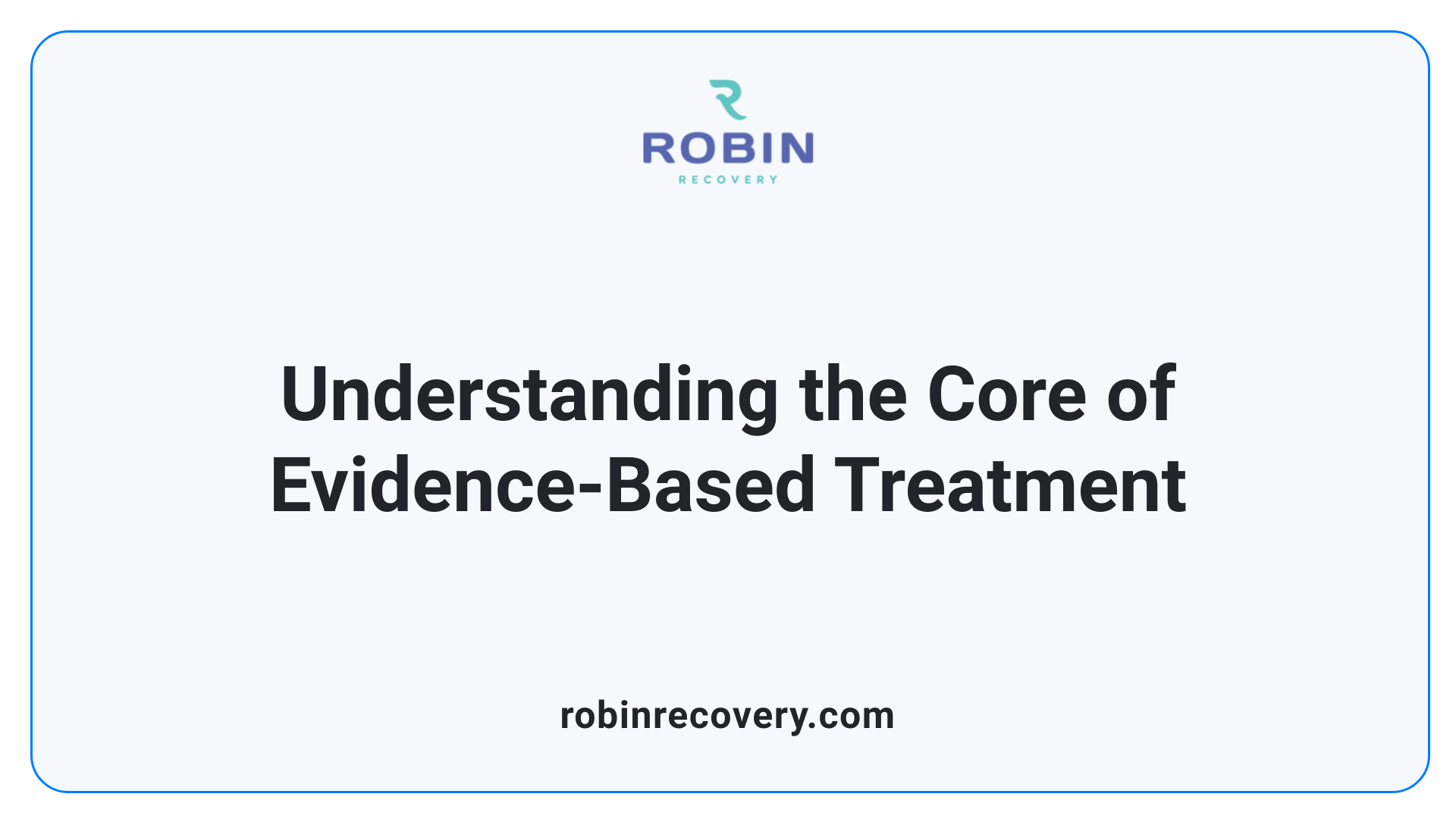
What is the meaning of evidence-based treatment?
Evidence-based treatment (EBT) refers to therapeutic interventions that have been rigorously evaluated and proven effective through scientific research and clinical judgment. This approach integrates the best available research with clinical expertise, along with the individual characteristics and preferences of patients.
To be classified as evidence-based, interventions must meet specific criteria established through rigorous testing, including:
- Empirical Efficacy: Outcomes are supported by scientific studies demonstrating effectiveness.
- Robust Evidence Ratings: The treatment should come from multiple studies showing consistent results across diverse populations.
- Clear Treatment Protocols: Therapies are well-defined, allowing practitioners to replicate the treatment reliably.
Examples of EBT include approaches like Cognitive Behavioral Therapy (CBT) and Motivational Interviewing, which specifically target various conditions such as anxiety, depression, and substance use disorders.
Ongoing research and practical application are vital to maintaining the relevance and efficacy of evidence-based practices within real-world scenarios. This ensures that EBT remains a safe and effective choice for mental health treatment.
Benefits and Significance of Evidence-Based Treatment in Mental Health
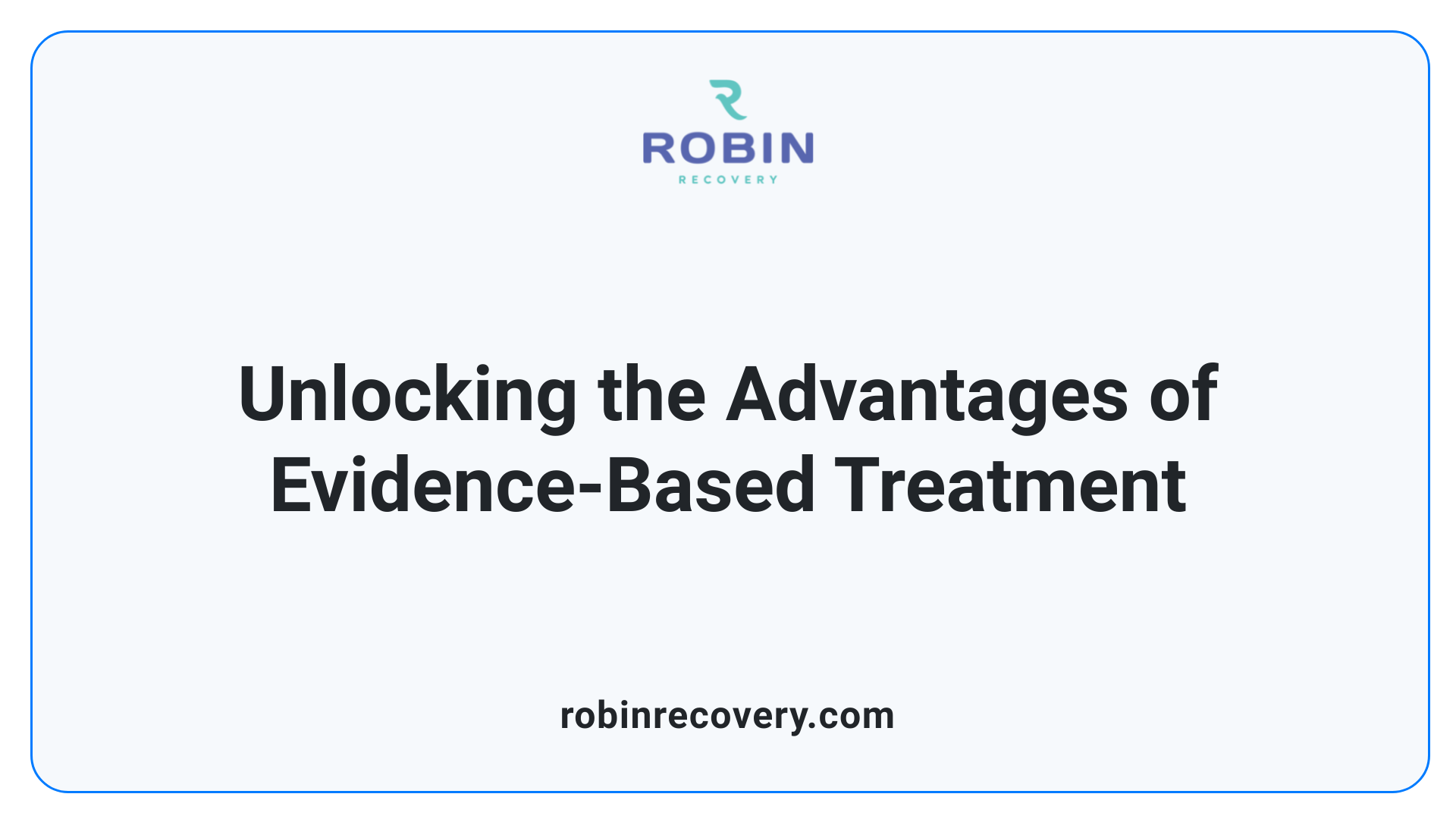
What are the benefits of evidence-based treatment in mental health?
The benefits of evidence-based treatment (EBT) in mental health are far-reaching and rooted in robust scientific research. EBT offers therapies like Cognitive Behavioral Therapy (CBT) and Interpersonal Therapy that have been proven effective for various mental health conditions. This foundation ensures a level of credibility and reliability that traditional methods may lack.
EBT stands out for its personalized approach. By integrating clinical expertise with individual patient preferences and cultural values, it leads to improved treatment outcomes. Patients feel more engaged in their care when their unique needs are prioritized, which can significantly enhance their commitment to the therapeutic process.
Is EBT cost-effective?
One of the notable advantages of EBT is its cost-effectiveness. Studies indicate that implementing evidence-based therapies can lead to reduced medical costs over time. Patients often experience improved quality of life, which subsequently decreases the need for more extensive medical interventions. This results in financial savings for both healthcare systems and patients.
How does EBT improve treatment outcomes?
Furthermore, EBT promotes accountability among healthcare professionals. By grounding treatment decisions in scientific evidence, EBT reduces bias in treatment selection. The emphasis on using proven methodologies directly correlates with improved care quality and higher patient satisfaction rates.
In summary, EBT is instrumental in addressing complex mental health needs by harnessing research-backed approaches, ensuring that treatments are not only effective but also tailored to individual patients.
Exploring Types of Evidence-Based Therapies
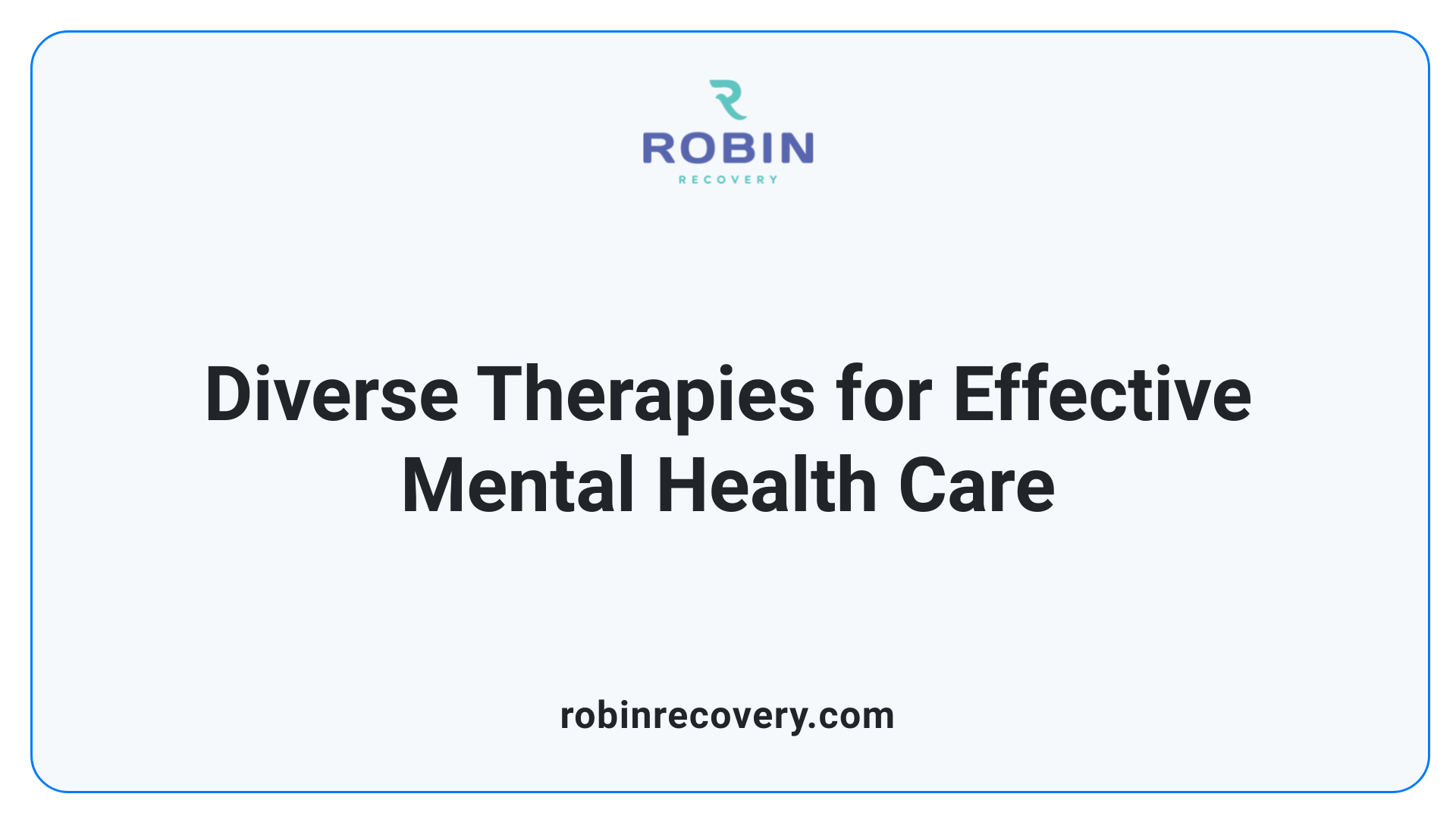
What are the examples of evidence-based therapies?
Evidence-based therapies (EBTs) are rigorously tested interventions that effectively address various mental health conditions. Here are some prominent examples:
- Cognitive Behavioral Therapy (CBT): Primarily used for anxiety and depression, CBT helps individuals identify and alter negative thought patterns and behaviors. Research shows that 6 to 20 sessions typically lead to healthier behavior.
- Dialectical Behavior Therapy (DBT): This therapy is tailored for Borderline Personality Disorder, incorporating mindfulness and emotional regulation techniques, validated by multiple studies.
- Eye Movement Desensitization and Reprocessing (EMDR): Particularly effective for PTSD, EMDR helps individuals process traumatic experiences and is supported by extensive clinical trials since its inception.
- Acceptance and Commitment Therapy (ACT): This therapy aligns individuals' actions with their core values, facilitating decreased negative thoughts and improved relationships.
- Behavioral Activation: Often employed for depression, this approach encourages participation in enjoyable activities to lift mood.
- Parent-Child Interaction Therapy (PCIT): An evidence-supported method for managing behavioral issues in children, enhancing parent and child interaction.
Applications in various conditions
Evidence-based therapies cater to a wide spectrum of mental health issues, proving efficacy across numerous settings. For instance:
- Anxiety Disorders: CBT is a preferred treatment, supported by extensive meta-analyses.
- Depression: Therapies like Behavioral Activation and ACT show significant effectiveness in alleviating depressive symptoms.
- Trauma and PTSD: EMDR and Prolonged Exposure Therapy receive high marks for their success in treating residual effects of trauma.
- ADHD and Conduct Disorders: Programs like Parent-Child Interaction Therapy offer structured guidance for managing these disorders effectively.
This integration of scientific research and clinical expertise ensures diverse, effective treatment options tailored to individual needs.
Methodologies and Criteria for Identifying Evidence-Based Practices
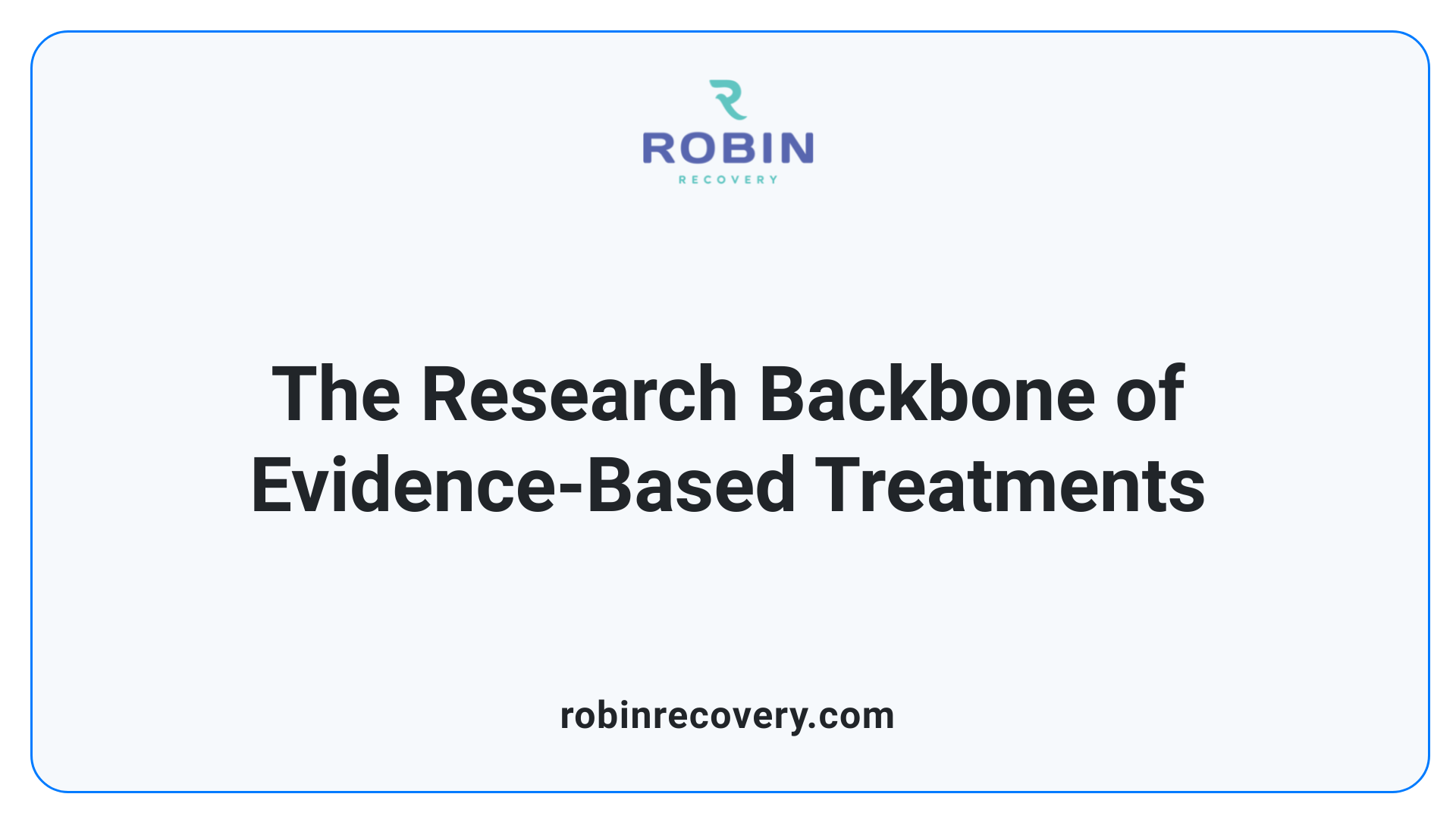
Research Methodologies in EBT
Evidence-based therapy (EBT) leverages a variety of research methodologies to validate treatment efficacy. Key methods include:
- Randomized Controlled Trials (RCTs): These are often considered the gold standard for evaluating therapeutic interventions. They compare treatment outcomes between a group receiving the intervention and a control group not receiving it.
- Meta-analyses: By aggregating results from multiple studies, meta-analyses provide robust evidence about the effectiveness of particular therapies.
- Effectiveness Studies: These assess how well treatments work in real-world settings, reflecting everyday clinical practice.
- Clinical Observations and Qualitative Research: These methods help gather insights on patient experiences and outcomes that aren't captured in more quantitative studies.
Criteria for EBT Designation
To designate a treatment as evidence-based, it must meet three primary criteria:
- Best Available Evidence: This encompasses findings from systematic reviews and clinical guidelines, ensuring the intervention is supported by rigorous research.
- Clinical Expertise: The clinician's professional judgment and experience play crucial roles in tailoring interventions to individual cases.
- Patient Preferences and Needs: Treatment must account for the unique values and circumstances of patients, promoting personalized care.
By integrating these components, EBT enhances the effectiveness and relevance of therapeutic interventions, ensuring a comprehensive approach to mental health care.
Evidence-Based vs. Evidence-Informed Treatments
How do evidence-based and evidence-informed treatments differ?
Evidence-based treatments (EBTs) rely on quantitative research and established effectiveness, embodying the highest standard of care. Popular examples include Cognitive Behavioral Therapy (CBT) and Dialectical Behavior Therapy (DBT). These therapies undergo rigorous testing in randomized controlled trials to demonstrate their efficacy.
In contrast, evidence-informed treatments do not share this level of validation. They may encompass therapies like Response Disequilibrium Therapy (RDx), which have not yet been thoroughly verified through scientific studies. Evidence-informed practices take a more flexible approach, integrating various types of evidence while emphasizing a patient-centered ethos.
Implications for healthcare
The distinction between EBT and evidence-informed practice significantly impacts clinical decision-making. EBTs provide a structured approach, ensuring practitioners adhere to proven interventions, whereas evidence-informed practices allow for greater adaptability, making them better suited for complex clinical situations. This inclusivity and flexibility are vital in healthcare, recognizing that each patient’s needs can vary widely.
Thus, while both EBT and evidence-informed treatment underline the importance of using research in therapy, their methodological differences influence their implementation and effectiveness in real-world healthcare settings.
Concept Definition & Characteristics Examples Evidence-Based Treatment Interventions grounded in rigorous scientific research CBT, DBT, EMDR Evidence-Informed Practice Integrative approach that combines diverse types of evidence, less rigid Response Disequilibrium Therapy (RDx)
Integrating Clinical Judgment and Patient Values in Evidence-Based Treatment
How does clinical judgment and patient values impact evidence-based treatment?
Clinical judgment and patient values significantly impact evidence-based treatment by ensuring that clinical decisions are tailored to individual patient circumstances. Practitioners use their clinical expertise along with rigorous research findings to navigate the complexities of treating diverse mental health issues.
The integration of clinical judgment allows therapists to consider factors beyond just textbook symptoms, enabling them to apply their personal experience and training when addressing each patient's unique needs. This is particularly important in mental health, where the context of treatment can vary widely among individuals.
Moreover, patient values and preferences play a crucial role in shaping treatment choices. When clinicians actively engage patients in the decision-making process, they consider what matters most to patients in their care, leading to higher satisfaction and better adherence to treatment plans.
This process emphasizes shared decision-making—a fundamental aspect of evidence-based medicine. Research shows that optimal outcomes arise from a partnership between clinician expertise and patient autonomy. By valuing both empirical evidence and the individual context of their patients, healthcare providers can craft personalized, effective treatment strategies that yield the best results.
In evidenced-based therapy, the goal is to harmonize clinical insights with patient preferences. This approach leads to more comprehensive care, as treatment is not solely based on research but also incorporates the voices and experiences of those receiving care.
Evidence-Based Practice for Diverse Populations
What is the role of evidence-based practice for different populations, such as children and adolescents, in mental health?
Evidence-based practice (EBP) is essential in shaping effective mental health interventions for children and adolescents. The unique developmental stages of youth necessitate treatment approaches that are tailored to their specific needs. This includes interventions designed with their physiological and psychological growth in mind.
Family involvement significantly influences the efficacy of treatment. A child's understanding of their mental health can differ from their family’s perspective, making it crucial to incorporate parental insights into planning and execution of interventions. Strategies that engage families in the treatment process enhance overall treatment success.
Furthermore, the use of EBP has been shown to yield positive results in school-based settings, addressing mental health issues like anxiety and depression effectively. Programs leveraging digital platforms have also emerged, providing accessible resources for this demographic.
Cultural considerations in EBT
Cultural sensitivity is paramount in delivering evidence-based therapies, particularly to diverse populations. EBP frameworks must be adaptable to reflect the varied cultural backgrounds, beliefs, and values of clients. Understanding cultural nuances ensures that treatments are relevant and respectful, fostering a trusting therapeutic relationship.
Tailored approaches help in identifying and removing barriers faced by underserved communities, increasing the effectiveness of mental health services. Customization of evidence-based strategies can lead to improved outcomes across different populations, making EBP a pivotal tool in the mental health landscape.
Controversies and Critiques of Evidence-Based Treatments
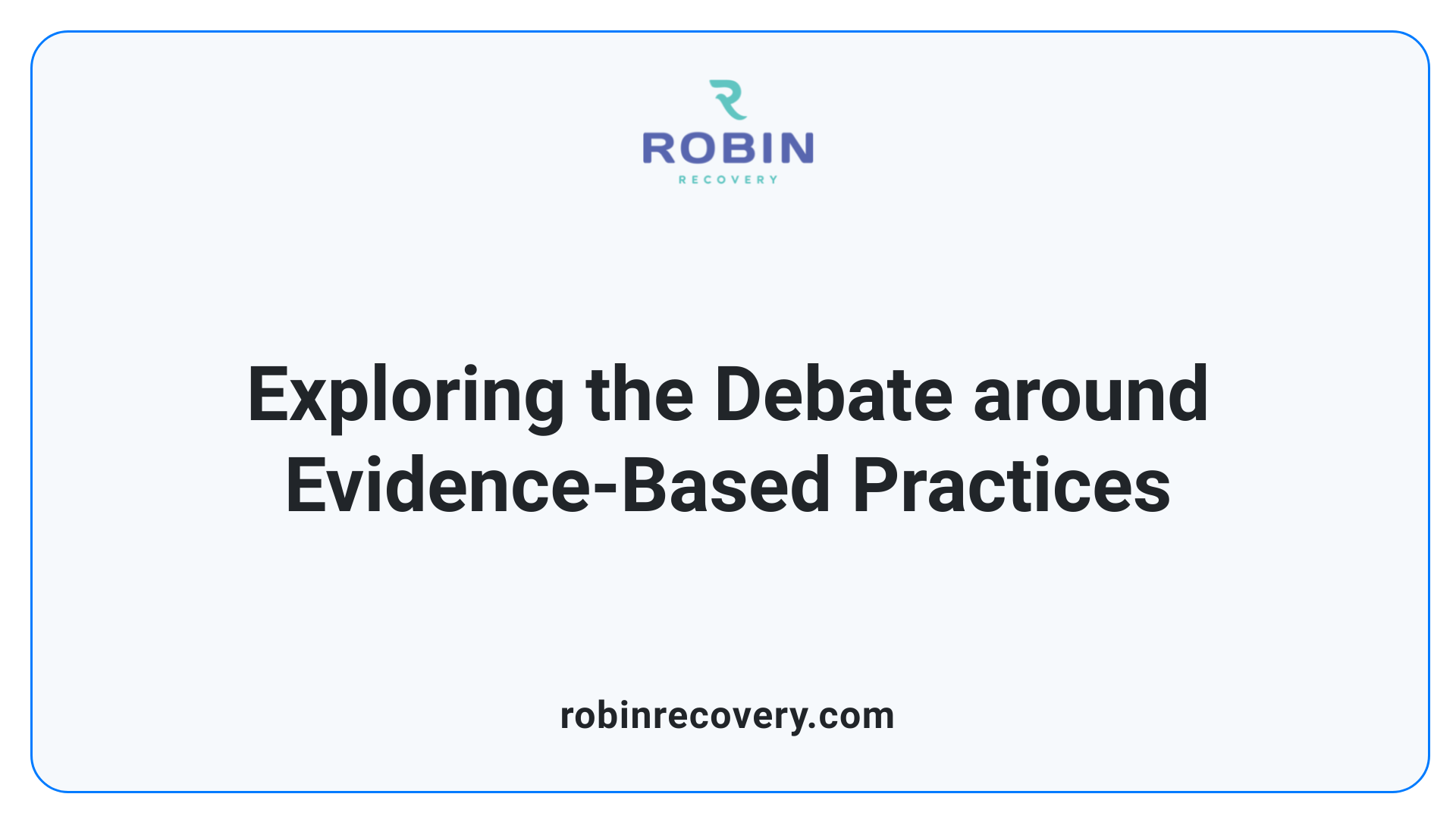
What are the controversies and critiques surrounding evidence-based treatments?
Evidence-based treatments (EBTs) are not without their controversies and critiques. A primary concern is that evidence-based medicine (EBM) often emphasizes statistical data over personal clinical expertise or patient values. This focus can lead to a one-size-fits-all approach, undermining the individualized care that many patients need.
Additionally, there are persistent debates regarding the effectiveness of EBTs. Critics point to the potential for publication bias, where studies showing positive results are more likely to be published than those with negative or inconclusive findings. This can distort the systematic reviews that inform clinical practice, making it appear that certain treatments are more effective than they might be in real-world settings.
Moreover, the rapid pace of clinical research can lead to inconsistencies and shortages in coherent evidence. This creates a challenging environment for practitioners trying to apply findings to their diverse patient populations. Misunderstandings about what EBM involves can also impede its successful incorporation into clinical practice, highlighting the need for ongoing dialogue among researchers, practitioners, and educators to bridge these gaps.
Effectiveness of Evidence-Based Treatments for Mental Health Conditions
How effective are evidence-based treatments for various mental health conditions?
Evidence-based treatments (EBTs) for mental health conditions are recognized as effective options for addressing a wide variety of disorders, particularly anxiety and depression. Clinical research supports that many of these therapies lead to significant improvements in symptoms and quality of life within approximately 12 sessions. Treatments such as Cognitive Behavioral Therapy (CBT), Acceptance and Commitment Therapy (ACT), and Dialectical Behavioral Therapy (DBT) have shown strong efficacy across multiple studies.
Despite their proven effectiveness, access to these treatments is declining in the USA and England due to several barriers. These include challenges at the patient level, such as stigma associated with seeking mental health care, as well as therapist-level beliefs that may not prioritize EBTs.
The National Institute for Health and Care Excellence (NICE) emphasizes EBTs as frontline treatments, prompting ongoing investments aimed at improving access to these therapies. The American Psychological Association bolsters this effort by promoting the integration of research evidence with clinical expertise, enhancing overall treatment outcomes.
Continuous professional development and supervision for therapists remain essential to maintain the quality and effectiveness of evidence-based therapies. This comprehensive approach ultimately aims to improve public well-being and the quality of mental health care across various settings.
Impact on patient care
EBTs are structured to be flexible, allowing for treatment tailoring to individuals’ unique needs and preferences. This personalization ensures that clients not only receive the most effective interventions yet also engage actively in their care. Studies demonstrate that the alignment of treatments with client values increases participation and satisfaction, which can lead to better outcomes.
Moreover, evidence-based approaches often entail collaborative decision-making, empowering patients by involving them in choices about their treatment plans. Such practices enhance the effectiveness of interventions and contribute positively to overall mental health outcomes. By facilitating a responsive and informed treatment environment, evidence-based therapies significantly uplift patient care in mental health services.
The Future of Evidence-Based Treatment
As the field of psychology continues to advance, evidence-based treatments will play a pivotal role in shaping the future of mental health care. By ensuring that interventions are grounded in research, clinical expertise, and patient values, EBTs offer a comprehensive approach to treatment that addresses the unique needs of individuals across different contexts. However, ongoing research, training, and collaboration among practitioners, researchers, and policymakers are necessary to address existing challenges and enhance the implementation of evidence-based practices in diverse settings. In doing so, evidence-based treatments can continue to evolve, ensuring effective, ethical, and personalized care for all individuals seeking mental health support.
References
- What Is Evidence-Based Therapy | Lyra Health
- What Is Evidence-Based Therapy? 16 EBP Therapy Interventions
- Evidence-based therapies - VA Mental Health
- Evidence-Based Psychotherapy: Advantages and Challenges - PMC
- Evidence-Based Practice in Psychology
- What is Evidence-Based Therapy? - CONCEPT Professional Training
- Evidence-based practice - Wikipedia
- Evidence-Based Treatment - an overview | ScienceDirect Topics
- Evidence-based vs. Evidence-informed Treatments
- LibGuides: Research Process: Evidence Based Treatment
